For the last four years, two Democrats—Joe Manchin of West Virginia and Kyrsten Sinema of Arizona—were arguably among the most powerful people in the country, a pair of independent votes in a deadlocked U.S. Senate whose support (or lack thereof) could make or break legislation impacting millions of Americans.
Both notably denied Democrats' efforts to overturn Republicans' blockade of their party's sweeping reforms to the country's election laws, drawing scorn from their president and their party.
Manchin used his vote to strong-arm both into concessions for a natural gas pipeline in his home state in a massive domestic spending bill earlier this year (he later pulled that bill under bipartisan pressure) and has had a prolonged flirtation with the Republican Party, going as far as attending events with Republican donors in red states like Texas.
And Sinema, labeled by Time magazine in one article as "Republicans' Favorite Democrat," has used her position in the middle to cut deals across the aisle as well as within her own party, which regularly found itself at the negotiating table with her to broker legislation that could get to 50 votes.
The next several weeks could very likely see their reigns as Congress' ultimate gatekeepers come to an end, however.
"I don't expect Manchin or Sinema to have much influence to be quite honest," Joshua Huder, a senior fellow at Georgetown University's Government Affairs Institute, told Newsweek.

Depending on the result of next week's runoff election between Georgia Democrat Raphael Warnock and Republican Herschel Walker, Democrats stand to control 51 seats in the U.S. Senate as well as the tie-breaking vote of Vice President Kamala Harris, requiring both senators to break with their party to sink a piece of legislation.
And that in itself is very unlikely. Manchin, one of Congress' most conservative Democrats, still votes with President Joe Biden's position 89 percent of the time, according to FiveThirtyEight; Sinema votes the party line 95 percent of the time.
And beyond the recent spending packages, both senators have unique priorities and their own agendas, rarely voting as a bloc. If the pair do find themselves in a situation where they can throw their weight around, it will be a challenge. Especially with one more vote to contend with.
"To the degree that they do have influence, it'll be much more in the vein of the infrastructure bill-type influence," Huder said in reference to concessions they received for fossil fuel permitting and corporate tax carveouts in a recent infrastructure package.
"They're not going to be able to kill Democratic initiatives like they did," he added. "They're not going to be able to threaten not to go along with the filibuster.
"They're not going to be able to do any of the stuff that really gave them a lot of veto power. They can be a positive influence in the sense that they can negotiate with Republicans, but that's really the limit of what they can do."
But there is also the fact Republicans control the House of Representatives, a balance of power that will require the GOP to moderate any legislation it passes to be able to succeed in the Democratically-controlled Senate.
Once Senate Democrats get legislation on their desk, it will have already been pored over and approved by the Republican majority in the House, leaving Democrats little room to alter it.
"Republicans will need to pass legislation that Democrats will accept, while what we've seen Manchin and Sinema do over the last couple of years is pull the legislation sufficiently far to the right to be acceptable to those pivotal House Republicans," said Gregory Magarian, a professor at the Washington University School of Law in St. Louis.
"So at that point, if we're thinking about this in fairly linear ideological terms, there really shouldn't be anything left for Manchin and Sinema to do," Magarian added.
Uncommon Knowledge
Newsweek is committed to challenging conventional wisdom and finding connections in the search for common ground.
Newsweek is committed to challenging conventional wisdom and finding connections in the search for common ground.
About the writer
Nick Reynolds is a senior politics reporter at Newsweek. A native of Central New York, he previously worked as a ... Read more
To read how Newsweek uses AI as a newsroom tool, Click here.






